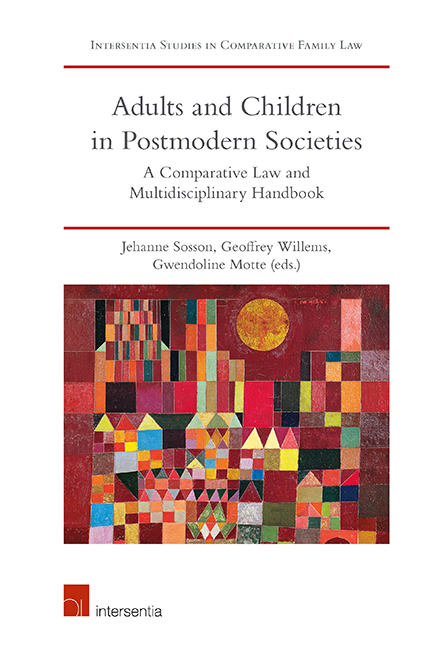Book contents
- Frontmatter
- Contents
- List of Cases
- List of Contributors
- Introduction
- PART I NATIONAL REPORTS ON LEGAL REGULATIONS OF RELATIONSHIPS BETWEEN ADULTS AND CHILDREN
- PART II INTERDISCIPLINARY APPROACH
- Historical Insights: The Historic Evolution of the Place of the Child in His or Her Family: From the Periphery, to the Centre, and Back?
- Philosophical Insights: The Weight of Truth in New Families
- Psychological Insights: Parent–Child Relationships in the Light of Psychology
- PART III INTERNATIONAL LAW INSIGHTS
- PART IV COMPARATIVE APPROACH
- General Conclusion: The Challenge of Transparent and Inclusive Parenthood/Parentality in a Pluralist and Cosmopolitan Context
- About the Editors
Philosophical Insights: The Weight of Truth in New Families
from PART II - INTERDISCIPLINARY APPROACH
Published online by Cambridge University Press: 26 June 2019
- Frontmatter
- Contents
- List of Cases
- List of Contributors
- Introduction
- PART I NATIONAL REPORTS ON LEGAL REGULATIONS OF RELATIONSHIPS BETWEEN ADULTS AND CHILDREN
- PART II INTERDISCIPLINARY APPROACH
- Historical Insights: The Historic Evolution of the Place of the Child in His or Her Family: From the Periphery, to the Centre, and Back?
- Philosophical Insights: The Weight of Truth in New Families
- Psychological Insights: Parent–Child Relationships in the Light of Psychology
- PART III INTERNATIONAL LAW INSIGHTS
- PART IV COMPARATIVE APPROACH
- General Conclusion: The Challenge of Transparent and Inclusive Parenthood/Parentality in a Pluralist and Cosmopolitan Context
- About the Editors
Summary
INTRODUCTION
The transformation of families today also involves a transformation in their relation to truth. Isn't there a paradox one should see here? On the one hand, families seem to demand more truthfulness from their members. On the other hand, plural truths coexist and a commonly agreed story seems more complex to reach. Consequently, the issues relate to the harmonisation of the sometimes widely divergent family truths and those relating to the fact that a decision may have to occur about which contradictory version will be authoritative. The law plays a decisive role in this dynamic, since it must arbitrate between truths that have become irreconcilable. Our hypothesis is thus that these new families generate higher expectations with regard to truth while at the same time making it problematic. Undoubtedly new challenges are also emerging: to be able to, or to have to, establish a legal truth when dealing with difficult family narratives marked by unsaid, secrets and lies, while knowing that the word of authority may itself have devastating effects on family truths.
THE DEMAND FOR TRUTHFULNESS AND THE PLURALITY OF FAMILY TRUTHS
If the question of truthfulness is taking on a new importance in families, it is because families are increasingly based on the quality of relationships. Indeed, today, the quality of feelings between two persons seems to be what guides the couple. In fact couples increasingly seem to be based on an agreement based on feelings of two reflexive emotional personalities, who unceasingly think about and evaluate the way they live their lives, in order to assess whether it corresponds to their expectations and conditions in view of their accomplishment and their fulfilment. In addition, a child and children are no longer inevitability a question of fate, but the result of a decision, which is, itself, based on a desire. Consequently, couples and families see themselves as hubs of love and commitment where everyone is recognised in his/her uniqueness and can find a basis to develop their self-confidence.
In the evolution of families, these demands lead to new pitfalls, because insofar as romantic relationships are more and more based on feelings and emotions, they are less long lasting than when the couple was based on moral and social engagement. Hence compositions, ruptures and recompositions abound in the history of couples and families.
- Type
- Chapter
- Information
- Adults and Children in Postmodern SocietiesA Comparative Law and Multidisciplinary Handbook, pp. 641 - 656Publisher: IntersentiaPrint publication year: 2019

